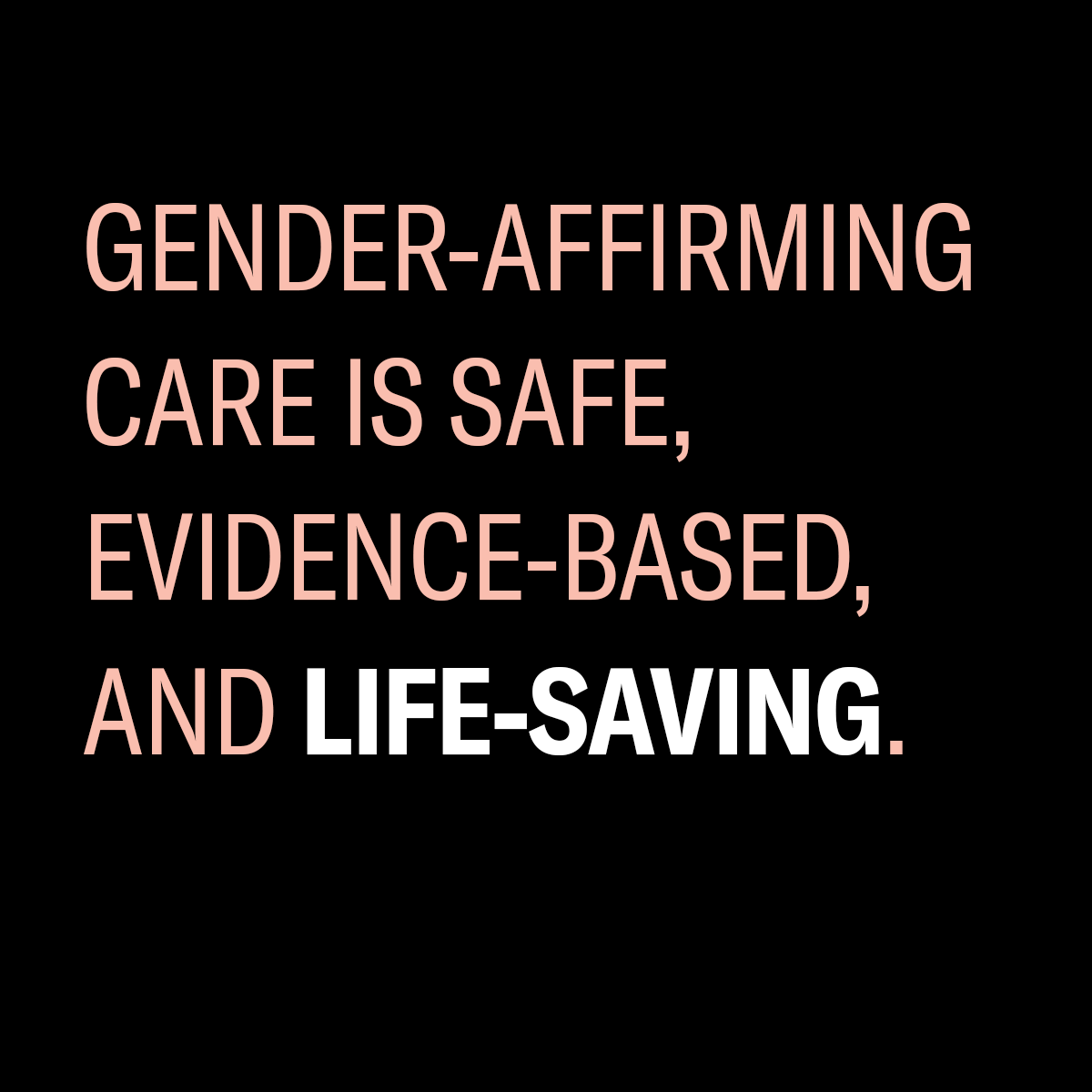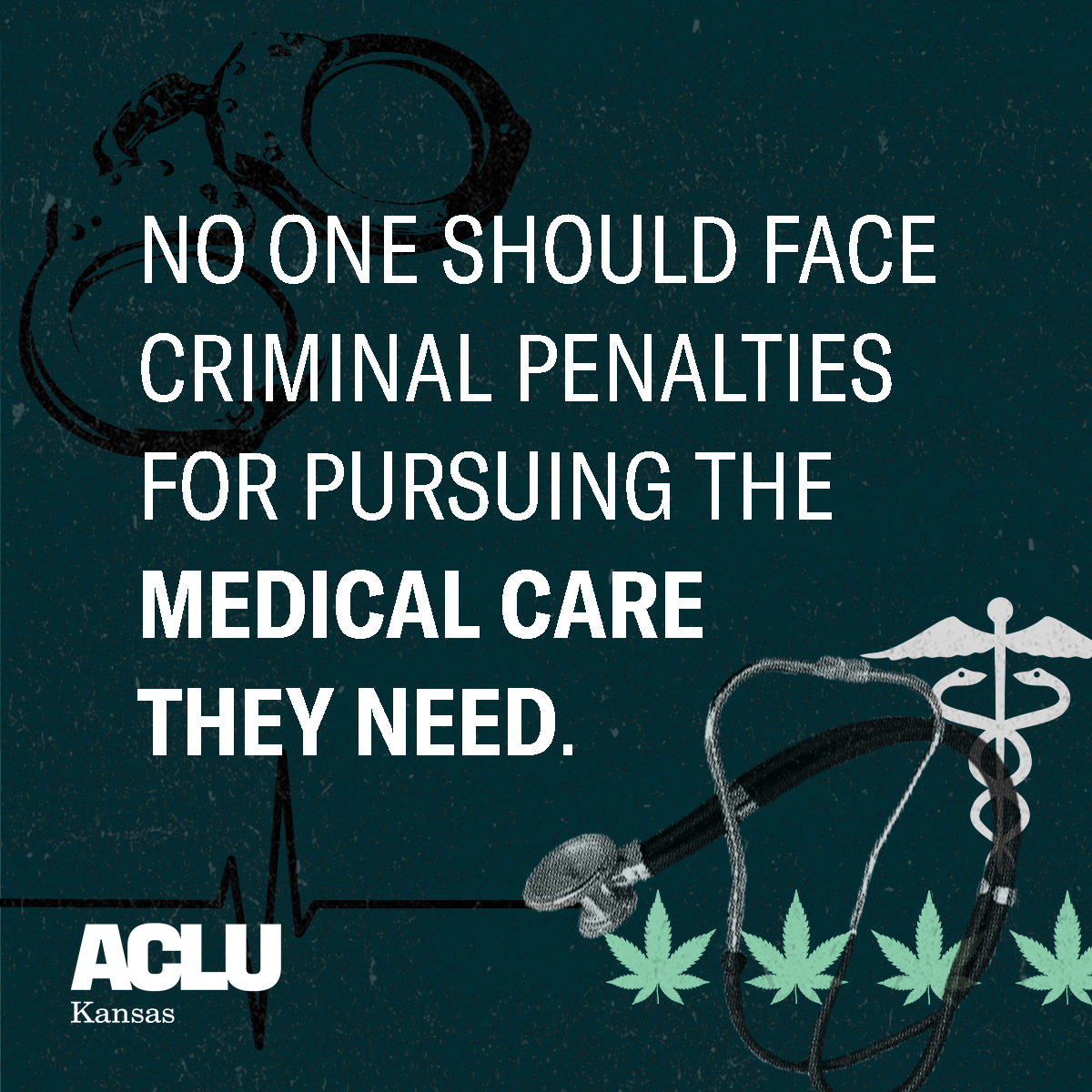5 Facts About Trans Athletes in Kansas
For the third year in a row, Kansas legislators have launched a discriminatory effort to ban transgender girls and young women from K-12 and collegiate sports in Kansas, in an effort to solve a “problem” that simply does not exist.
As in every previous legislative session, the arguments that proponents of this year’s sports ban rely on false assumptions about biology, athleticism, and gender. Proponents claim banning transgender girls and women would protect the cisgender girls and women who play sports—but its adoption would have the opposite effect, opening all girls and women up to unnecessary scrutiny and potentially invasive examinations just to be able to play sports in Kansas. It would ultimately needlessly demonize and harm some of the most vulnerable Kansas kids.
Believing and perpetuating myths and misconceptions about trans athletes is harmful. Be sure to ignore the myths, remember the facts, and protect trans athletes in Kansas.
- Despite the fact that trans people of all ages have been participating in sports as their true selves for years, there is simply no evidence of categorical dominance by trans athletes at any level of competition—across the country or in Kansas. In fact, proponents of bills like HB 2238 have yet to provide a single example of a trans athlete who has caused any harm in Kansas athletics, and only two students in Kansas would actually be impacted by the most recent bill.
- Excluding trans girls and women from competing in women’s sports harms all girls and women seeking to play sports in Kansas. Rather than “protecting” girls and women, policies like that included in HB 2238 would invite gender policing that could subject any girl to invasive accusations of being “too masculine” or “too good” at their sport to be a “real” girl. Additionally, research shows that states with policies like HB 2238 actually have decreased participation by all girls in sports.
- Including trans girls and women in women’s sports benefits all girls and women seeking to play sports in Kansas. Research shows that states with trans-inclusive sports policies—allowing trans girls and women to play women’s sports—have consistent or increased participation by all girls in sports. Additionally, inclusive policies lead to improved mental health, better grades, and increased safety for trans youth.
- Trans athletes do not have a universal advantage in sports. In fact, there are many social and physiological factors that impact success in sports. The notion that trans girls have an automatic advantage in sports has no merit and is based on two false premises—the false idea that trans girls are really boys, and the false idea that being assigned “male” at birth gives a person an unmitigated competitive advantage in all sports. Trans youth vary in athletic ability, just like cisgender youth—physical characteristics like size, strength, and athletic ability vary from person to person, regardless of whether they are cisgender or transgender. And success in any given sport depends on a myriad of factors outside of these physical characteristics, like access to good coaches and facilities, financial status, ability to practice, level of self-discipline, and more.
- There are real issues with gender parity in sports when it comes to funding, resources, pay equity, and more— but banning trans girls and women from playing women’s sports in Kansas does nothing to address those real problems. Instead, HB 2238 singles out one group of girls and women for different treatment and bans them from playing sports as themselves—something Title IX was explicitly adopted to prevent.
Date
Thursday, February 23, 2023 - 12:00pm
Featured image
Show featured image
Hide banner image
Related issues
LGBTQ+ Rights
Show related content
Pinned related content
[OPPOSE] HB 2238: Banning transgender girls from sports
LGBTQ+ Advocacy Resource Hub
Tweet Text
[node:title]
Type
Menu parent dynamic listing
Show PDF in viewer on page
Style
Standard with sidebar
Show list numbers
Author
D.C. Hiegert
Gender-affirming care is life-saving, and we all should have the right to access the healthcare we need to survive and thrive—without government interference.
But in 2023, legislative attacks on transgender people, have exploded across the country. This includes here in Kansas, the Free State, where radical politicians have leveraged their lawmaking power and highly inflammatory rhetoric to spread blatant disinformation.
Some of these attacks are bans on gender-affirming care, like SB 233, which represent perhaps the most egregious examples of how politicians sidestep expert medical advice, overreach the appropriate level of governmental regulation of medicine, and intrude on the deeply personal healthcare decision of trans youth and their families.
Here are five facts about gender-affirming care for trans young people that show why we need to ensure access:
1 — Every major medical association agrees: gender affirming care for young trans people is medically necessary, safe, effective, and evidence-based. The American Medical Association, the American Academy of Pediatrics, the American Academy of Child and Adolescent Psychiatry, and other groups all support gender-affirming care for transgender youth and oppose bans like SB 233 which seek to criminalize providers who want to provide safe, effective, medically necessary, and evidence-based care to young people in need.1
2 — Trans young people do NOT make healthcare decisions on their own.
Psychologists, psychiatrists, family physicians, and specialists all work together with trans young people and their families to determine the best course of treatment. They develop a care plan that is unique and individual to the patient and their needs. For minors, parents or guardians must consent to the treatment plan.
3 — Gender-affirming care differs vastly depending on age. Prepubescent trans kids do not receiving permanent or irreversible medical care such as surgeries—regardless of what fearmongering politicians might claim.4—Research shows that 98% of young people that start gender-affirming care as adolescents continue that care as adults.
Among the small number of people that do stop receiving gender-affirming care, the most common reason for doing is not because of regret, but rather because of inability to afford continuing the care or because of fear of violence for living as a trans person.
5 — There’s no evidence that families are being pushed into this care. Rather, they’re able to determine what’s best for their kids after proper evaluation and informed consent. Healthcare bans would take away the only options families have for safe, evidence-based medical care
You can show up and support evidence-based, gender affirming care for Kansans and Kansas kids with us by telling your legislators not to support anti-trans legislation this session.
1 See, e.g., https://www.ama-assn.org/press-center/press-releases/ama-reinforces-oppo....
Date
Wednesday, February 15, 2023 - 11:30am
Featured image
Show featured image
Hide banner image
Related issues
LGBTQ+ Rights
Show related content
Pinned related content
LGBTQ+ Advocacy Resource Hub
[OPPOSE] SB 233 (and SB 12): Restricting gender-affirming healthcare
Tweet Text
[node:title]
Type
Menu parent dynamic listing
Show PDF in viewer on page
Style
Standard with sidebar
Show list numbers
Author
D.C. Hiegert
We’ve had enough of our state’s antiquated laws criminalizing medical treatments for Kansans in need. Let’s be clear: marijuana is medicine, and it’s time to legalize medical marijuana in Kansas.
Medicinal marijuana would improve the lives of Kansans in three key ways:
1. Cannabis is proven to be a safe and indispensable tool for people with diverse health needs across the world. Veterans with PTSD, cancer patients, and other sick Kansans would finally be free to safely, and legally, benefit from these health care options.
2. The War on Drugs has trampled Kansas communities, especially Kansans of color. Medical marijuana would be a big step towards ending the harmful government overreach, letting people make their own healthcare decisions, and reversing the cyclical impact of criminalization.
3. Through legalization, we could promote equitable opportunities for small business owners through a tiered licensing system and could also remove felony limitations and prohibitions on licenses.
We’d love your voice with us at the capitol in Topeka on Wednesday, February 22 for our Medical Marijuana Day of Action. You’ll get connected to a community of advocates, learn more about the path forward in Kansas, and let your lawmakers know: the time to end the prohibition of medical marijuana is here.
Together, we can create an equitable, regulated industry for medical marijuana and end the cycle of harm that criminalization of safe medical treatment has caused in our state.
RSVP HERE FOR OUR DAY OF ACTION ON FEB. 22.
You can also make an appointment to meet with your legislators before or after the Day of Action program while you’re at the capitol! We’ll provide you with talking points and everything you’ll need to make sure your lawmakers hear from you.
We hope you’ll help us advocate for medical marijuana in Kansas—together we can bring about this long overdue change to the Sunflower State.
Date
Tuesday, February 14, 2023 - 5:30pm
Featured image
Show featured image
Hide banner image
Related issues
Criminal Legal Reform
Show related content
Pinned related content
[Support] Proponent Testimony for Medical Marijuana
Medical Marijuana Day of Action
Tweet Text
[node:title]
Type
Menu parent dynamic listing
Show PDF in viewer on page
Style
Standard with sidebar
Show list numbers
Author
Leslie B.
Pages


